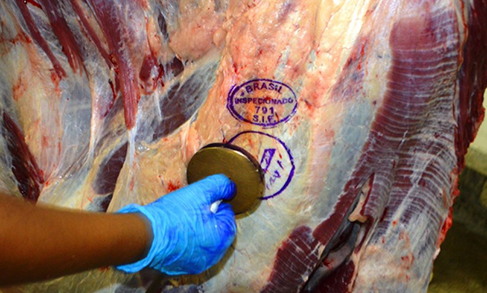Enterprise Pulse Survey
Pandemic was responsible for closure of 4 out of every 10 enterprises
July 16, 2020 09h00 AM | Last Updated: July 22, 2020 12h12 AM

Among the 1.3 million enterprises that had stopped their activities temporarily or permanently in the first half of June, 39.4% reported as a main reason the restrictions imposed by the coronavirus pandemic. The impact on the companies was widespread in all the economic sectors, having reached 40.9% of the trade companies, 39.4% of service companies and 35.1% of industry ones.
The data comes from the new Enterprise Pulse Survey: Impact of Covid 19 on Enterprises, released today (16) and which is part of the IBGE's experimental statistics. For additional information on the IBGE actions against the pandemic visit our hotsite covid19.ibge.gov.br.
Among the 2.7 million active companies, 70% reported that the pandemic had a general negative impact on business and 16.2% that the effect was small or inexistent. On the other hand, according to 13.6%, the pandemic brought opportunities and had a positive effect on the company.
By sector, the biggest percentage of enterprises on which the pandemic has had a negative effect is Services (74.4%), followed by Industry (72.9%), Construction (72.6%) and Trade (65.3%).
Data indicates that Covid-19 had a stronger impact on the segments whose activities demand human contact, have low productivity and are intensive in terms of labor, such as services rendered to families, including activities such as bars and restaurants, and lodging; besides the construction sector," says Alessandro Pinheiro, head of the IBGE's Department of Structural and Special Surveys for Enterprises.
Small enterprises were most seriously affected by sales drop
For seven out of every ten active enterprises, the pandemic resulted in a decrease in sales or in traded services in the first half of June, against the period prior to the start of the pandemic. The impact was bigger among small-sized companies, with up to 49 employed persons, with almost 70.9% reporting decrease in sales.
Decrease was also observed in 62.9% of the medium-sized enterprises (with 50 to 499 employed persons) and 58.7% of large-sized enterprises (with more than 499 employed persons). Among the sectors, the drop in sales was bigger in construction (73.1%) and services (71.9%), especially services rendered to families (84.5%) and trade (70.8%), with a highlight to trade of vehicles, pieces and motorcycles (75.5%). In industry, 65.3% of the companies reported a reduction in sales.
About 60% of the enterprises reported more difficulty producing goods and serving clients in the first fifteen days of June, against the period preceding the pandemic – as reported by companies in the segments of trade (67.2%), construction (65.5%) and services (59.5%).
Other 60.8% reported difficulty in the access to suppliers, with a bigger impact on trade (74.0%), especially trade of vehicles, pieces and motorcycles (87.4%). In Industry, 62.7% of the active enterprises reported similar impact.
A total 63.7% of the companies found it difficult to make payments
A total 63.7% of the active enterprises reported difficulty making regular payments in comparison with the period prior to the pandemic, and that difficulty reached 64% of smaller companies and 35.6% of bigger ones.
Such drawbacks were widespread among the sectors, and affected seven out of every ten trade companies and six out of every ten i the industry and services sectors. It is worth pointing out that 33% of the total active enterprises did not report a significant change, either because they succeeded in resuming their activities and revenue or because they had financial reserves and managed to maintain regular payments," says Flávio Magheli, coordinator of the Structural and Special Surveys for Enterprises.
Line of credit for payroll becomes a reality for 13% of the companies
The survey also reveals that the crisis caused by the pandemic caused companies to make a series of decisions about their employees. About 60% of the active companies kept the same number of employed persons as in the beginning of the pandemic. Among the ones reducing the number of employed persons, 37.6% reported a drop by 25% of the employed persons and 32.4% a reduction between 26% and 50% in the number of employed persons.
"There was no significant change in the number of employed persons in relation to the start of the pandemic, in construction, trade, industry or wholesale. Even the small enterprises indicate they have kept the same number of workers, and that may be related to the fact some persons were sent to home office shifts or that the enterprises having obtained some type of line of credit. The fact is that there was no such steep decline as expected at first," Mr. Magheli adds.
Among the 12.7% of enterprises that reported having obtained an emergency line of credit pay their employees, 67.7% reported that action was only possible after receiving support from the government.
Other 44.5% of the enterprises reported having postponed the payment of taxes since the beginning of the pandemic, in which more than half (51.9%) indicated they had governmental support for the adoption of that measure.
About 90% of the active enterprises surveyed conducted information and prevention campaigns and adopted extra hygiene measures in their activities, with 38.4% adopting home office shifts for workers and 35.6% bringing worker's vacations forward.
32.9% of the companies changed the method for delivering their products or services
There were also changes in the supply of products and services: 32.9% of the companies reported changes in the delivery method; including a change to online services and 20.1% reported having launched or started to trade new products and/or services in the first fifteen days of June, versus in the beginning of the pandemic.
The collection of Enterprise Pulse: Impact of Covid 19 on Enterprises, which monitors the effects of the novel coronavirus pandemic on industry, construction, trade and services sectors - started on June 15 and was conducted by telephone with data collected from about two thousand persons.
The results are released every fifteen days and are available on the hotsite covid19.ibge.gov.br, with information for the country and Major Regions. The first release presented comparisons between the first fifteen days of June and the period preceding the start of the pandemic, March 11. The subsequent editions will bring comparisons with the immediately previous fifteen days.


















